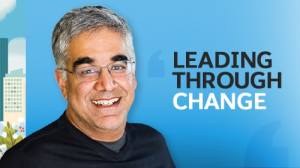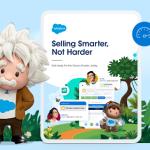As we face four major crises — global health, the economy, equality, and leadership — how can business leaders help guide the way? In an interview with Salesforce CEO Marc Benioff, Workday Co-Founder and CEO Aneel Bhusri says it takes a mindset change.
“Companies can step up and show that we have a soul and we want to do the right thing. We all need to think about more than our share price. We’ve got to think about our community, our employees, and our customers in a far more complex way than we have historically.”
In this installment of our Leading Through Change series, Bhusri shares his thoughts on leading with values in the midst of a crisis, and what enterprises can do to ensure their efforts translate into a better world. His words have been lightly edited for content and clarity.
On valuing employees
We’ve always been “employee-first,” [but] you never know if your value system really works until you hit a crisis. When we realised the pandemic would go on much longer than predicted, we wanted to assure our employees they would be taken care of right out of the gate. We gave every employee in the company a two-week bonus just to get ahead of issues they might have. It allowed them to bring their whole selves to work and know the company was looking out for them. And when you lead with your employees, happy customers come next.
On addressing racial injustice
There’s nothing like a crisis to force you to lean on your core values. If we lose this moment of opportunity, shame on all of us. I feel really energized right now because this is a time where the right conversations are happening. There has to be a major change in mindset. Great Places to Work CEO Michael Bush makes a great point — you’ve got to listen and understand, and then you’ve got to take action.
Companies like ours can step up and be forces for good and forces for change. In our product, we have diversity dashboards where you can [track the progress of your workforce diversity initiatives]. I’ve always believed that if you can measure it, then you can change it. There’s not a chief human resource officer (CHRO) in the country I’ve talked to that doesn’t want to do the right thing.
On technology’s role in recovery
We have to get the economy going, but we have to do it in a safe way. Innovation, new ideas, and creativity are going to help us get through this. For example, marrying the employee and skills data we have in Workday with Work.com makes reopening for our customers a lot easier because the data and solution sets are complementary and powerful.
I’m amazed at how quickly our customers are reinventing themselves to fit this new world using our technology. A large manufacturer built an app on Workday to track COVID-19 cases and inform them where to move manufacturing capacity. A major retailer delivered more than a million one-time hazard paychecks to take care of their employees. Use of our workforce and financial planning applications grew 30 times in the last few months as customers continue scenario planning.
I do think being a cloud company is both a technology advantage and a mindset advantage. We just see the world differently — we see it as open and connected.
On reskilling the workforce
Forty-one million people in the US are out of work, but many of the jobs they had aren’t going to come back. Through private-public partnerships, we have a real opportunity to retrain millions of people and give them skills that are going to make them successful for the next decade. We’re working with states to identify the hiring needs of their largest employers, while those governments invest in the training programs we need to reskill these workers.
On hope for the future
We’ve learned a lot about how to deal with pandemics and we’ll learn a lot about how to be resilient. We will come out a stronger country in dealing with racism. It gives me hope we’re taking on these issues and not being silent while trying to do the right thing. We’re going to look back at this as one of the most meaningful times in our life.
Watch the full interview with Aneel Bhusri and a performance by Leon Bridges below.
This conversation is part of our Leading Through Change series, providing thought leadership, tips, and resources to help business leaders manage through crisis.
This post originally appeared on the U.S.-version of the Salesforce blog.

























